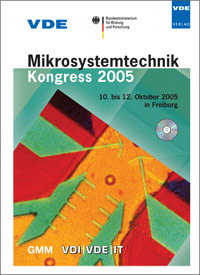Overview Micro Process Technology
Conference: Mikrosystemtechnik Kongress 2005 - Mikrosystemtechnik Kongress 2005
10/10/2005 - 10/12/2005 at Munich, Germany
Proceedings: Mikrosystemtechnik Kongress 2005
Pages: 4Language: englishTyp: PDF
Personal VDE Members are entitled to a 10% discount on this title
Authors:
Bayer, Thomas (Siemens AG, Frankfurt am Main, Germany)
Abstract:
In recent years low–cost engineered components with structural features in the range of microns to millimeters (“micro structured objects”) have become available in a wide variety of chemically resistant materials such as glass, stainless steel, ceramics, polymers, alloys and graphite (and no longer only silicon). These new objects offer stimulating perspectives for the development of a new generation of highly original process components and systems for chemical process development and production. When applied in laboratory plants, micro structured components allow the efficient gathering of experimental data for process development. They give access to new routes for process transfer into production scale. Finally, in many cases the application of those devices in production plants can improve quality, safety and effectiveness significantly. The traditional way of process development from lab to production (scale-up) is time and cost consuming. Very often a lot of problems are linked to scale-up. This is due to a change in scale, e.g. from millimeters to centimeters resulting in dramatic different heat and mass transfer characteristics. Therefore in general the reaction design has to be adapted to the performance of the apparatus used, e.g. solutions are diluted or dosing is extended. Often reduced qualities or reduced selectivity’s cannot be avoided. Micro structured devices could overcome these drawbacks. It has to be mentioned that it is not necessary to carry out all process steps in micro structured devices. Not “as small as possible”, but “as small as necessary” should be the guideline for the application. And micro process technology does not replace the classical way of chemical production, but it gives new possibilities for a lot of chemical processes, especially in the fine and specialty chemistry, but also in the pharmaceutical industry. Production- on-site and production-on-demand can become more important and therefore change the way of producing and distributing chemicals.


